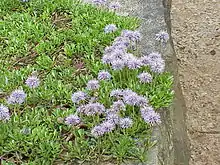| Globularia cordifolia | |
|---|---|
 | |
| Scientific classification | |
| Kingdom: | Plantae |
| Clade: | Tracheophytes |
| Clade: | Angiosperms |
| Clade: | Eudicots |
| Clade: | Asterids |
| Order: | Lamiales |
| Family: | Plantaginaceae |
| Genus: | Globularia |
| Species: | G. cordifolia |
| Binomial name | |
| Globularia cordifolia | |
Globularia cordifolia, the heart-leaved globe daisy, is a species of flowering plant in the family Plantaginaceae, native to the mountains of central and southern Europe, and western Turkey.
It is a mat-forming evergreen perennial growing to 5 cm (2 in) tall by 20 cm (8 in) wide, with spherical, fluffy, pale lilac flowers in summer. In cultivation it requires the open aspect, full sun and sharp drainage of its native habitat, and is best grown in an alpine garden.[1]
The Latin specific epithet cordifolia means “with heart-shaped leaves”.[2]
This plant has gained the Royal Horticultural Society's Award of Garden Merit.[3][4]
References
- ↑ RHS A-Z encyclopedia of garden plants. United Kingdom: Dorling Kindersley. 2008. p. 1136. ISBN 978-1405332965.
- ↑ Harrison, Lorraine (2012). RHS Latin for Gardeners. United Kingdom: Mitchell Beazley. ISBN 978-1845337315.
- ↑ "Globularia cordifolia AGM". RHS Plant Finder. Royal Horticultural Society. Retrieved 14 July 2020.
- ↑ "AGM Plants - Ornamental" (PDF). Royal Horticultural Society. July 2017. p. 43. Retrieved 3 March 2018.
![]() Media related to Globularia cordifolia at Wikimedia Commons
Media related to Globularia cordifolia at Wikimedia Commons
This article is issued from Wikipedia. The text is licensed under Creative Commons - Attribution - Sharealike. Additional terms may apply for the media files.
